#Sykes-Picot Agreement
Text
1916 – Sykes-Picot Agreement
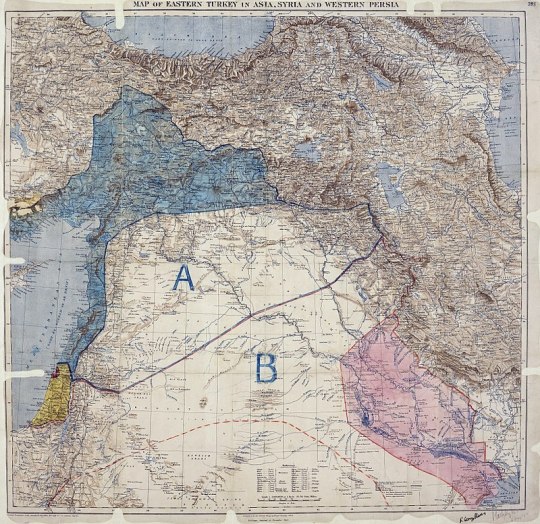
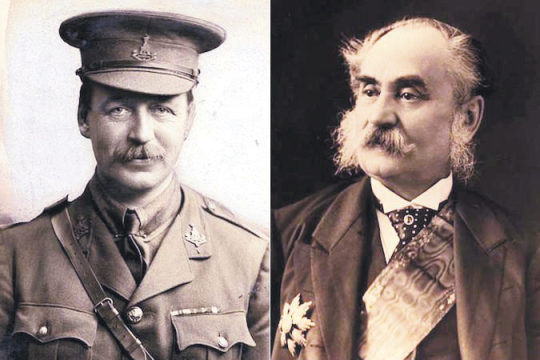
The United Kingdom of Great Britain and Ireland and the French Third Republic sign the secret wartime Sykes-Picot Agreement partitioning former Ottoman territories such as Iraq and Syria.
1 note
·
View note
Text
Podcasts on the Sykes-Picot Agreement and the Balfour Declaratoin
#Empire Podcast#Israel#Palestine#Palestinian History#British History#Israeli History#Sykes-Picot Agreement#Balfour Declaration#William Dalrymple#Anita Anand#Spotify
0 notes
Text
I try not to make a lot of original posts on topics I don't actually have any expertise on, but I haven't seen a whole lot of posts going around that actually... explain what happened and why? Like, the actual order of events, the history, and so on. I want to reblog reference posts and explanations by people who actually know what they're talking about, but I haven't seen anything that hits the buttons I need to actually get a political situation... but I have seen some stuff on other platforms.
So here are some videos I've personally found useful in understanding Israel-Palestine, because that's the format I've found most useful in processing information of this nature:
Why Israel was Originally Attacked from RealLifeLore (explains the decades of political dynamics, internal demographic tensions, and power shifts leading up to the current conflict; notably the best I've seen at actually explaining what 'Israeli Occupation' actually means)
Israel-Hamas War: Last Week Tonight with John Oliver (HBO) (commentary on the actual current situation in terms of who's getting attacked, why, and what the international ramifications so far are)
What's Happening in Israel and Why with Nathan Thrall from Adam Conover, series Factually (a discussion with an on-the-ground journalist about what life was like on the ground for Palestinian people in the areas under Israeli control during the last few years, just up to the attacks themselves)
I'm not going to claim these are comprehensive or completely unbiased (there are a few moments where I'm not entirely sure of the bias levels myself), but for people like myself who came into all this unsure of what the actual situation even is, I think these are a solid set to build up an basic understanding from which to put together opinions on future information.
I can't tell anyone what to think about how or why any of this is happening. I can only really tell you that what's going on right now is a crime on the level of attempted genocide, and that the years leading up to that have been an absolute mess on almost all fronts.
Again, I have no expertise on this subject. I just know what kind of video essay, political commentary, and interview style makes things understandable to me, personally, and might work for others. Please be courteous and kind in the comments and tags, as I am only sharing this because I haven't seen such a resource making the rounds yet, not actually trying to sway anyone in a particular direction beyond "the mass death needs to stop."
If you know of similar, relatively unbiased* resources, feel free to share.
* By 'relatively unbaised,' I don't mean taking or not taking a side; I just mean that it doesn't try to hide some information or other in favor of pushing a narrative, doesn't try to generalize a population, or doesn't seem to be trying to use emotional gut reactions to get readers or viewers to jump past reason or compassion.
#israel#palestine#israel palestine conflict#palestine israel conflict#not fandom#politics#current events#resources#information#video essays#interviews#political commentary#I'm not even sure how to tag this#I'm not even sure I should be making this post because it's not really my place. But. IDK it feels like 'hour long video essay' etc#is a much better resource to explain things than the usual 2 minute videos I see circulating#and the 2minute videos have a purpose! But. they're not really explaining everything#I didn't know that Israeli Occupation applied to regions outside the original Sykes Picot agreement until I read an article a few weeks ago#and I didn't UNDERSTAND it until the RealLifeLore video
190 notes
·
View notes
Photo
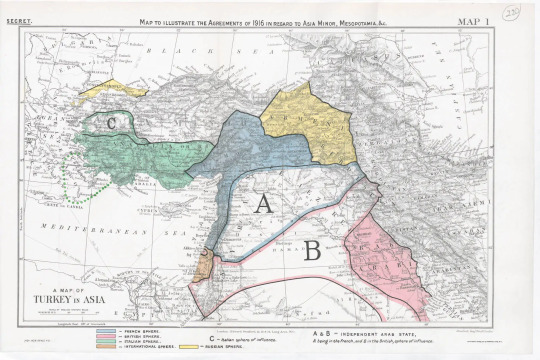
A line in the sand. The [secret at the moment] Sykes-Picot agreement from 1916.
75 notes
·
View notes
Text
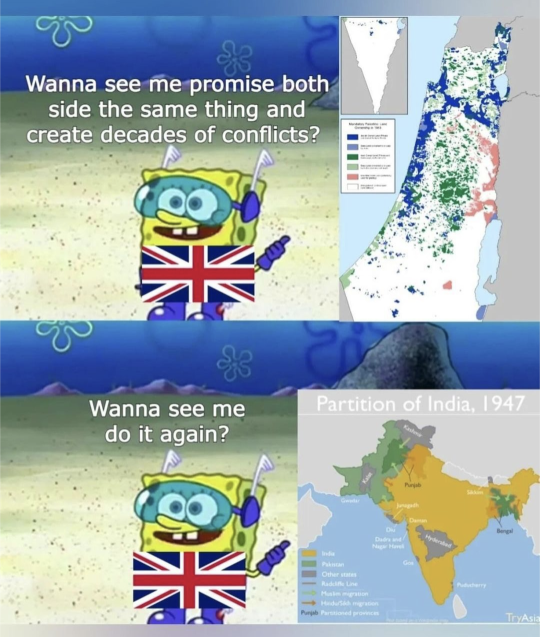
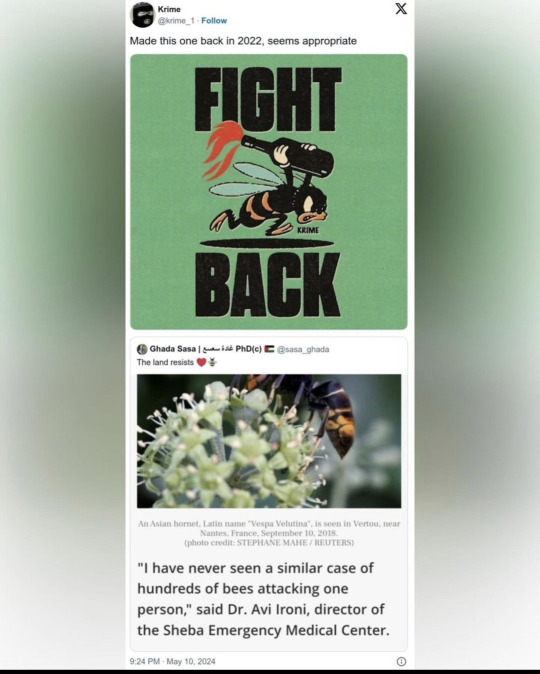
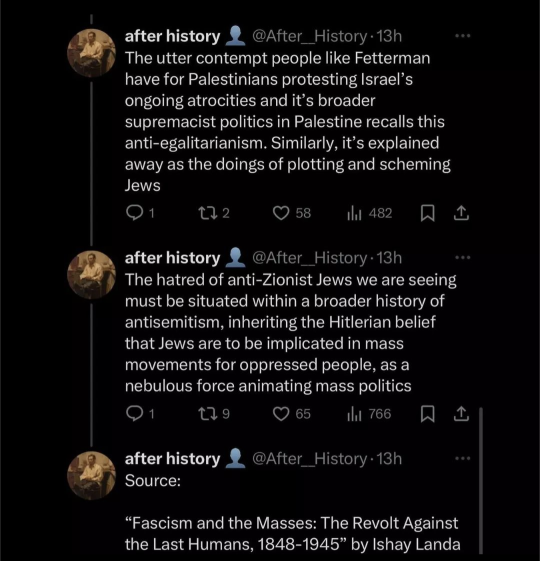
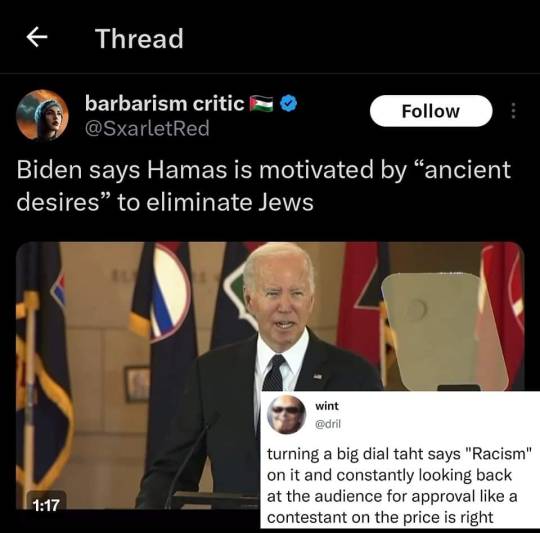
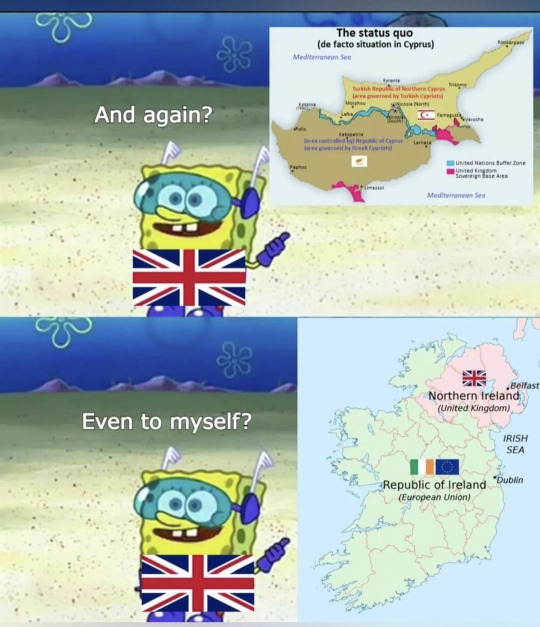
More like the Psych-Picot Agreement.
#palestine#gaza#british imperialism#sykes picot agreement#british israelism#zionism#partition of india#ireland#cyprus#bees
6 notes
·
View notes
Text
People do not realize that when we say Israel is a settler-colonial state, we mean it was literally devised in junction with European imperialism around the turn of the century.
Political Zionism was founded by Theodore Herzl. Originally, Zionists were not specifically interested in the land of Palestine as a colonial project. In fact, Herzl was debating making Argentina the focus of mass Zionist migration, which is quite ironic considering Argentina's colonial and Aryanist past. British-controlled Uganda was also offered as a possibility by Joseph Chamberlain, a Conservative imperialist.
To encourage mass Jewish migration to Palestine, he worked with the British, who had recently drove the Ottoman Empire out of the Levant, and now boasted political dominance in the region, thanks to the Sykes–Picot Agreement between the UK, France, Italy, and Russia which covertly authorized British influence in Palestine, which had become a target of colonial expansion. He specifically wished to collaborate with Cecil Rhodes, a British imperialist who played a lead role in colonizing Zimbabwe and Zambia, and later took inspiration from his time spent extracting wealth from Africa as the founder of mining conglomerate the British South Africa Company.
Herzl’s personal goals for Zionism were colonial. He said in a letter to Rhodes:
“You are being invited to help make history. It doesn’t involve Africa, but a piece of Asia Minor; not Englishmen but Jews […] How, then, do I happen to turn to you since this is an out-of-the-way matter for you? How indeed? Because it is something colonial […] I […] have examined this plan and found it correct and practicable. It is a plan full of culture, excellent for the group of people for whom it is directly designed, and quite good for England, for Greater Britain [...]”
At that time, Palestine was predominately populated with Arab Muslims and Christians, as well as Arab Jews (Old Yishuv) and Druze. Jews made up around 6% of the population. The Ottoman government specifically released a manifesto at the start of Zionist migration condemning the colonization, stating:
“[Jews] among us […] who have been living in our province since before the war; they are as we are, and their loyalties are our own.”
The Balfour Declaration of 1917 on behalf of parliament, officially established the British Mandate of Palestine, sowing the seeds for the modern state of Israel, by means of the UK's ongoing occupation of the region.
Zionism was never about promoting Jewish culture or safety; it has always been tied up in Western (settler-)colonial expansion. !من النهر إلى البحر
#palestine#since you guys are being obtuse😔#1) the ottoman empire was bad#2) herzl is obviously not the only representative of zionism#3) both zionism and anti zionism have complex discourses within them#4) jewish people are not a monolith
13K notes
·
View notes
Text
Colonialism never ended

Okay, let me talk about one thing that a lot of white folks don't quite seem to realize. And that is the fact that colonialism never really ended.
Like, the official telling of it was: "Oh, yeah, after world war 2 the colonizing nations realized it was wrong." Or, if it is more honest, then: "Yeah, after world war 2 the colonizing empires were out of money to uphold her colonies." But even that still very much is a total lie. We still live under colonialism - both settler colonialism and extractionist colonialism.
Probably the easiest way to realize, we still have settler colonialism in place, is to look at the amount of land that never was in any way or form given back to the indigenous folks who once called it their home. No, they do not get to live there again. And also, no, they will not see a penny of the money that might be extracted from their former homes through development, agriculture or for example oil extraction.
In the US the state that shows it maybe the strongest is Hawai'i, in which indigenous folks are more and more pushed away from where they were living and praying, as parts of the island get used for tourism, rich people homes, military stuff or maybe a nice observatory on one of their sacret sights. More and more indigenous Hawai'ians are forced to move away from Hawai'i. Because through the rich folks and their development, they cannot afford to live on their own islands any longer.
We also see it through extractions. I already spoke about the land in the USA, but the same is happening in so many other places. A lot of land (especially mines) all over Africa are still owned by white people directly or indirectly. So they will still, to this day, extract the wealth from it.
Or, heck, we have all those exotic fruit plantages all over the tropical regions. Like how the US literally overthrew a government to keep the banana productions going and keeping it in white people hands.
Or there is of course the fact that the fucking lines onf the maps we have now have been drawn by white people, artificially grouping people together, who might not even be from the same culture. Something that often instabilized nations - an outcome that was very clearly intended, to make it easier to control and extract value from the nations in question.
Just look at the entire thing with the Sykes-Picot-agreement, that is responsible for so many of the wars happening in the Arabian world right now. Or at the division of India, that was and still is cause for so much violence.
And of course, while Slavery is officially outlawed, the US kinda contructed its justice system all around keeping it further going. By criminalizing Black people for all sorts of stuff and then making unpaid prison labor legal.
Colonialism is still going strong. And really, whenever western nations go crying about China's neocolonialism, what they are really crying about is, that it loosens their own colonialist control over them. Not that there is colonialism happening at all.
And we cannot have a just world, until we fully decolonize and until reparations are paid for the evils that have happened for now five hundred years.
This is also, why we cannot have anything in terms of solarpunk futures, until we decolonize. Because solarpunk aims for a just world. A just world that cannot exist unter colonialism.

#solarpunk#colonialism#anti colonialism#decolonize#decolonisation#no justice no peace#indigenous rights#land back#first nations#social justice
186 notes
·
View notes
Text
The yankees seeing irish reaction and sentiment to the ongoing genocide in Palestine really warranting a fucking history lesson, yet again, to dispel their ignorance because they think that we either jumped onto the bandwagon for clout or think "irish problems have nothing to do with Palestine???"
A primer, for ye fucks
Since apparentl a tonne dont bother looking into the depths of the Sykes-Picot agreement and Balfour Decleration and how the enactment of these two things was done literally during the irish war of Independance and architechetured by the same people constantly trying to shoot and beat us into not existing as a people anymore.
How many of ye would have known that Ronald Storrs literally described the intent for the creation of a Zionist state as a "little loyal jewish Ulster" as a ethnonationalist loyalist outpost in the middle east for Britain to use as a source of support and force to leech resources out of the local populus. They literally modelled their plans of the plantation of Ulster where they effectively tried to exterminate irish people in the North and was the foundation for 500 years of nonstop coloniser oppression
Or worse. How following the war of Independance, the brits sent the literal Black and Tans, Churchills own personal pet project designed to let pscopathic lunativs roam Ireland freely with the only mission being to beat, burn, murder and terrorist civilians. Not the IRA. Civilians. They were enlisted right out of the RIC and Auxs and transferred right into Palestine to do the exact same thing to native palestinian communities
This solidarity between us isnt some new shit. We were the brits fucking petri dish to experiment and run all their initial colonial methods on that they then suplanted into the middle east and were then inherited by the planter state bombing civilians and treating palestinians like cattle now
So if I hear another american say some stupid shit about how theres no paralleles between us or reason for us to feel such a deep empathy for whats happening, Im going to punch a hole in a brick wall




38 notes
·
View notes
Note
I mean this with ZERO disrespect, I'm simply trying to educate myself on this matter because it impacts us all.
All I can find about the Israel-Palestine conflicts is the fighting. What I want to know is why.
Whats the backstory? Why are they fighting? Why is everyone persecuting one another and who in the government is responsible?
I heard Hamas bombed Gaza and has taken hostages. What brought on this violence? Do all the Palestinians agree with this?
(More personal opinion questions, you don't need to answer these)
Do you agree with Hamas? Do you think that violence was a last resort to free Palestine? Do you think it's justified?
One thing I do hate is people saying "I hate *this group of people*, they are bad." They can't all be bad. So I don't like the titles of Anti-Israel/Anti-Palestine because you're assuming everyone there is on the same side.
In conclusion, people are stupid. The government is messed up. Citizens and families want to live so why won't the government let them?
I’m genuinely grateful that you’re asking because educating ourselves is one of the greatest tools we have. I’ll break it up into sections.
1. What’s the backstory?
In 1918, the Ottoman Empire conceded land they controlled to Britain (this is still an ongoing problem regarding many, many things because the Ottoman Empire controlled many nations that weren’t theirs to control if you catch my drift. Look up the Elgin marbles for a fun wormhole of WTF Britain). The Arab Revolt was backed by France and Britain with the promise that if the Arab fighters could force the Ottomans out of the area of the Levant, they would be granted independence (McMahon-Hussein Correspondence) but, plot twist, France and the UK instead split the region (Sykes-Picot Agreement). The Balfour Declaration of 1917 expressed Britain’s support of the creation of Israel. After they gained control of the region, they established Israel and systematically began to take the land of Palestinians.
Note: Zionism began as a belief in the mid-18th century. Many, MANY Jewish people do not subscribe, encourage, or promote the idea of a Jewish state. I do not view Israel = Jewish because it is antisemitic to imply that the Jewish diaspora all exist under the state of Israel. Especially when many Jewish people disagree with Israel.
Note note: Zionism was created as a response to the numerous pogroms and other antisemitic hate crimes affecting Jewish people. the Holocaust was fucking awful. No ifs ands or buts. Genocide doesn’t justify genocide, however.
Continuing on. So, clearly, the Palestinians are pissed. They were promised independence and instead now have their land taken by a global superpower who has historically fucked over hundreds of countries (another wormhole for you: India under British rule, Ireland and literally all of its history with England, the transatlantic slave trade under Britain, Africa under British rule, Australia and the treatment of Aboriginals under British rule, America and the British, it goes on). Palestinians revolted from 1936-1939 because, again, their home and promise of independence was being stolen. They lost against the British army but then 1939 was a bit of an important year for everyone and they world was sucked into another world war.
With WWII saw the birth of the United Nations, an organization that might sound important but has the moral backbone with the equivalence of a chocolate eclair. The UN said “hey, why don’t we split Palestine and Israel into two different states so maybe they’ll stop fighting” (United Nations Partition Plan for Palestine) and, as a result, the 1948 Palestine-Israel war began. Hundreds died. 700k+ people were forced from Palestine and spread across the world in what is called the Nakba. Israeli colonizers quite literally moved into homes that had been occupied by Palestinians only days before. In 1918, the Jewish population of the region was 8.1%. In 1948, when Israel was recognized as a nation by the UN, the Jewish population of the region was 82.1%.
2. There’s plenty of infographics and videos explaining the next few decades but I’m already writing an essay basically so the gist is: Palestinians keep losing their homes and Israel keeps taking them. Israel forces the Palestinians into smaller and smaller parcels of land until the control virtually everything but a small strip of land (Gaza) and the West Bank. That brings us to 2006.
Hamas was elected in 2006 over rivaling Fatah, gaining majority amount of seats in the Palestinian Legislative Council under the promise that they would help end the corruption many Palestinians were frustrated with. Instead they took military control over Gaza and established an autocratic state over millions of people who were already suffering under barbaric policies and practices from Israel. Politicians.
This is where things get a little…messy morally. Do I agree with Hamas? Fuck no. I couldn’t care less about Hamas because they don’t care about Palestinians. Do all Palestinians agree with Hamas? Firstly, you will rarely find a group of people where all agree with some. Secondly, I don’t think they appreciate being bombed by Israel while Hamas leaders chill somewhere else. The people of Palestine are the victims of Hamas and Israel.
Did some Palestinians celebrate Hamas’ actions? Yes. Do I think violence is a last resort? Yes and no. Do I think it’s justified? Yes and no.
Lemme expand on those last two points. I want to be an international human rights attorney someday. The loss of innocent life is always a fucking tragedy that I hope to help prevent or to bring justice for them. I understand violence. I understand why people are so angry. I understand the rage and grief Palestinians feel. 75 years of having their rights stripped away, their homes quite literally occupied, their land and culture chipped away piece by piece, and their children bombed and shot at.
“But how on earth can you think violence is justified if people get hurt!” The American Revolution was an act of violence that got numerous people killed yet you will rarely find someone who won’t justify it. Ukraine defending themselves against Russia wanting their land with no regard to how many Ukrainians they kill is considered justified.
People just seem to focus on the “violence is bad” aspect of things once POC are involved. Yeah, I said it. Americans tired of taxation, of British rule, and of not having their independence causes property damage, argues with soldiers in the streets, and starts a war is okay but when Palestinians do it, it’s a problem? When Black Americans ask to stop being brutalized by the police, it’s a problem? When Black South Africans ask to end an apartheid state, it’s a problem? When Central Americans ask for western nations to stop causing coups that destabilizes their nations, it’s a problem? I could go on.
Yeah, violence is bad. Violence is also the way that a lot of countries are where they are today. Violence is sometimes the only reason why things changed. Violence is enacted on the oppressed everyday yet people only seem to really care once the oppressed fight back.
3. I’m anti-Israel because I don’t agree with the government and the state of Israel. I don’t agree with their 75 years of violent oppression of Palestinians. I don’t agree with their current or past actions. I’m anti-Hamas. I think they’re a vacuous organization that is more focused on getting what they want than considering the consequences of innocent Palestinians.
I’m also really fucking furious at Joe Biden’s insistence that we send aid to Israel. We have given Israel $260 BILLION since 1948. BILLION. And yet we have people dying because they can’t afford healthcare. Students leaving school because they can’t afford tuition. We have 8 year olds in debt because they can’t afford school lunches. The unhoused population is growing rapidly due to the housing crisis. I can sense the unemployment rate creeping higher. I know many people who have lost their jobs this past month alone. We’re days away from another government shutdown and they can’t vote on a speaker.
American politicians would rather send Israel billions more to bomb innocent people than to feed their own citizens. That, in my opinion, is a sort of violence that can never be justified.
#honey.txt#sorry for the essay#but really not sorry#I took a whole class on the global south during the Cold War and it really opened my eyes#granted my specialization is Central America but plot twist#America has been at the center of fucking stuff up there too
36 notes
·
View notes
Note
Re that ask you received on your use of the term - ‘Zionist entity’ : the phrase Zionist entity refers to the IDF, various spy agencies, settlers—etc., collectively. It’s use is not intended to incite. Israel is a self proclaimed Zionist state and the fiercest supporters of Israel are self proclaimed zionists. With the (French-British) Sykes-Picot Agreement, and then the (British Zionist) Balfour declaration, came the mass, violent displacement of Palestinians. Though it’s frustratingly often framed as cultural-religious war between Arabs and Jews (does not make sense, but is an easy narrative to pull), it’s actually a result of French-British, specifically Zionist (and not with the greater interests of the Jewish people at heart) violent colonial efforts.
Yes you're right!!! I agree. A lot of the time when we (Palestinians) refer to zionism, we acknowledge the entire apartus of oppression and recognize that none of these things are separate. And I'm not speaking purely from an academic standpoint — this is everyday language we implore. Highly recommend checking out this resource to learn more about some of the agreements anon mentions:
31 notes
·
View notes
Text
I’m sure the letters written by Ned and Faisal have been posted before on this site, but the recent developments in the region have led me to re-think about the significance of their relationship once again. To me, the relationship between Faisal and Ned is really the epitome of what could have been and what we have lost due to the imperialist and colonial ambitions of the so-called Great Powers. If there were no Sykes-Picot Agreement and the Balfour Declaration, if the French did not use military force to drive Faisal out of Damascus, if Ned could truly achieve his post-war visions of Arab independence by helping Faisal become the King of a pan-Arabist Arab Kingdom of Syria (which have gained widespread local support and made the most geopolitical and ethnoreligious sense from a long-term stability perspective), the world would truly be enjoying the peace and prosperity of their long-lasting legacy. The letters did not talk about the Arab Kingdom of Syria, but the genuine and painstaking emotions of their words after 100 years remain truly heartbreaking and will forever remind people of the tragedy of a broken dream that was once shared between two hopeless idealists.

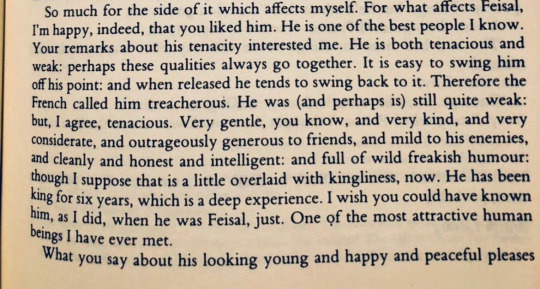

#t.e. lawrence#lawrence of arabia#faisal i of iraq#emir faisal#faisal bin hussein bin ali al-hashemi#arab kingdom of syria#arab revolt#wwi#middle east#letters
21 notes
·
View notes
Text
Read up on the history of European imperialism and Zionism in World War I. I mean it. You have to get it clear in your head that Israel would not exist without Christian European (and later, American) imperialism. Here's a short 5 Facts article, with links to longer lectures (with full transcripts):
Jewish Zionists were just some guys, and would have remained just some guys if the European powers with imperial military might hadn't decided that Zionism conveniently dovetailed with their agenda of maintaining/expanding their colonial empires. That's why (some of) the Jewish Zionists were lobbying for British patronage in the first place.
Excerpt from this lecture (that's also linked in the above 5 Facts article and has a full transcript):
Beginning around the 31 minute mark:
"Now, the saga of 1917 had one final, important chapter. On November 2nd, as British and Australian forces were engaging the Ottomans at the third battle of Gaza, Britain made yet another advance booking for the political arrangement of the postwar Middle East. The Balfour Declaration, which promised Zionists that Britain would sponsor the establishment of a Jewish homeland in Palestine.
Now the proximate origins of the Balfour Declaration traced back to the spring of 1917, when Lloyd George set Sykes the task of working for the addition of Palestine to the British area designated by the Sykes-Picot Accord. Sykes jumped at the chance to revise this accord, and by then Sykes had come to know about Zionism, an ideology at that time, barely 40 or 50 years old, which defined the Jews as a singular nation deserving of political sovereignty - the goal Zionists considered pressing given the incidents of anti-Semitism in the world, especially in the Russian Empire, where most European Jews lived.
In Zionism, Sykes saw an opportunity to nullify France's portion in an internationalized Palestine. He saw that a Jewish enclave in Palestine could function as a buffer protecting British, Egypt and the canal from imperial competitors. Sykes was encouraged when he learned that, for their part, the Zionists were interested in British patronage, without which they would be powerless to fulfill their dream.
But like the Hashemites, the Zionists didn't know anything about the Sykes-Picot Agreement. They had assumed that there would not be any type of conflict with any power.
There were, of course, other motives that prompted Sykes and British statesmen to support Zionism. One of these had to do with the belief among many British backing - who backed the Jewish territory, that the Jewish territorial nationalism might encourage Jews in the wavering countries of the United States and Russia to fully engage in the war until total victory. At the time, Russia was in a state of unrest and it wasn't certain to what extent the United States would sort of engage in the war.
There was this idea among the British that, you know, backing a Jewish homeland in Palestine would mobilize the power of Jewish financiers in the United States. But, of course, the idea that world Jewry acted as a bloc was an exaggeration of its unity and its ability to influence opinion. There are actually very few Zionists among the Jewish population in Europe or America.
Yet the idea of international Jewry was a common one, and it reflected the genteel and sometimes vociferous anti-Semitism that was current among the British upper class. But I must say that this was not an idea that the Zionists’ lobbyists in London made efforts to nullify. They saw that there is utility in this idea of a Jewish bloc, you know, heavily in favor of Zionism.
Yet another factor leading to British support for Zionism had to do with the visceral, romantic and religious sensibilities of these same British statesmen. Despite this defense advisory note that I was just talking about that dissuaded the media from religious pronouncements, men like Sykes, Lloyd George, Leo Emery and Foreign Secretary Balfour - whose name was appended to the declaration - shared with the people of Britain a pietistic instinct and were attracted to the idea of having a hand in the return of a people of the Bible to its ancestral homeland.
Lloyd George, the former chapel boy from North Wales, famously quipped that he knew the map of the Holy Land better than he did that of France. During his 1904 trip to Jerusalem, Sykes wrote, quote, 'Imagine how picturesque and interesting a walk in the city would be if the children of Israel retained their ancient and handsome dress.'
Sykes' mission to sabotage the Palestine portion of the French-British Agreement turned out to be rather simple and straightforward. During meetings in London, he convinced Zionism's leading lights Chaim Weizman and Nahum Sokolow to go directly to Georges-Picot and other French officials and argue their case. Sykes, in the meantime, would take care of the introductions and quietly reinforce the Zionist case at functions and over dinner drinks.
In the end, I think, due as much to Weizman and Sokolow's charm as to their arguments of justice and repatriation for the Jewish people, the French were won over agreeing that the plan for Palestine's internationalization should be rescinded. But then again, with no troops in the region, the French would have been powerless to make a contrary case. It's at this point that the Zionists got wind of the Sykes-Picot Agreement.
They got wind of this agreement in April 1917, just prior to the final dotting the I's and crossing of the T's. And they were shocked to see that Palestine, which they assumed was going to be theirs, was, according to the Sykes-Picot agreement, going to be internationalized. And thus they pressed Britain for the Balfour Declaration to make some sort of official pronouncement on the matter.
The declaration itself went through many revisions, every word in it was significant. The authors avoided the word 'state,' choosing the more ambiguous phrase 'national home.' Nor was the extent of this Jewish homeland made clear. It was to be somewhere in Palestine.
And although reference was made to the protection of the civil and religious rights of the indigenous native Arab population, the declaration said nothing about the Arabs’ political rights. In addition, the declaration promised that with the establishment of the homeland, no harm would come to Jews in any other country, meaning the Jews of Great Britain and other Western countries.
And here the intended target of this phrase were Jews belonging to the British establishment who were amongst the declaration's most vociferous opponents. Men like Edwin Montagu, a cabinet minister, feared that Zionism might lead some or even many within British society to call his and others’ patriotism into question, even accuse them of dual allegiance: are you loyal to the Crown or to the Jewish national home? And the declaration takes pains to make the point that this will not happen.
So in 1917 [...] Britain's conflicting agreements were finally exposed to the harsh lights."
25 notes
·
View notes
Note
Can you explain the Iran-Israel situation please?
Alright, let's get to it. Please note that I'm writing this on mobile during my lunch break, so I can't include reference/source links as much as I'd like. Thankfully, most of what I'm going to be telling you should be easily located by searching for an article on one of the following: APNews, Reuters, BBC Global News Podcast, Democracy Now!, NPR, or The New York Times. Long-term background is probably best found in videos by the YouTube channels Real Life Lore or tldr global news, or on Wikipedia if you prefer text.
The short version: Israel attacked Iran's consulate in Syria to get at some of the military commanders that were there, which is legally equivalent to attacking Iran itself. Iran responded by sending about 300 bombs at Israel, most of which were shot down in transit. Given that they still called it a success, even though it seems only one person was even hurt, my understanding is that it's very likely that they only intended the rockets to be a show of force, rather than an actual escalation, because Iran can't afford a war right now.
To support my blogging so I can move out of my parents’ house, I do have a ko-fi. Alternately, you can donate to one of the charities I list in this post OR this post.
The long version:
Okay, let's start with some background on Israel, then Iran. This is... a lot, so if you already know the broad strokes skip down to 2023.
Israel was established following WWII by the English and French, following borders the two countries had secretly drawn up decades earlier in the Sykes-Picot agreement. The intent was to give the Jewish people a place to go... or, depending on who you ask, a place to send them. Their ancestral homeland was viewed as the best choice, sort of like a deportation millennia after a diaspora. Given that WWII had just ended by the time Sykes-Picot was actually put into effect, 'getting out of Europe' was something a lot of Jews were given to agree with.
The Arab world was not happy, as that land had belonged to the Ottomans for centuries, and had long since 'naturalized' to being Arab. I'm not going to pretend to know the nuances to when people do or do not consider Palestine to have been its own nation; it was an Ottoman state until WWI, at which point it came under British control for just under three decades, and that period is known as the British Mandate of Palestine; it ended after WWII, with the creation of Israel. Palestine's land and people have sort of just been punted around from one colonizer to another for centuries.
Iran is the current form of what was once Persia. They were an empire for a very long time, and were a unitary monarchy up until the early 20th century; in 1925, Iran elected a Prime Minister who was then declared the monarch. The following several decades had Iran's monarchy slowly weakened, and occasionally beset by foreign interventions, including a covert coup by the US and UK in 1953. The country also became more corrupt throughout the 1970s due to economic policy failing to control inflation in the face of rising oil prices.
In 1979, there was a revolution that overthrew the monarchy and the elected government, replacing the system with a theocracy and declaring Iran to be an Islamic Republic, with the head of state being a religious authority, rather than an elected one. This was not popular with... most countries. 1980 saw the closure of all universities (reopened in 1983 with government-approved curriculums), as well as the taking of over fifty American hostages from the US Embassy in Iran. You may have heard about that in the context of Ronald Reagan encouraging Iran to keep the hostages until the end of Carter's term in order to force the election.
So, the West didn't like having an Islamic state because it claims to like democracy, and also because the Islamic state was explicitly anti-American and this has some Bad Effects on oil prices. The Soviets didn't like having an Islamic State because a theocracy goes directly against a lot of communist values (or at least the values they claim to have), and weakened any influence their supposedly secular union could have on Iran and the wider middle east. The other countries in the Arab world, many of them still monarchies, didn't like the Islamic republic because if the revolution spread, then it was possible their monarchies would be overthrown as well.
(Except Oman, which is not worried, but that's the exception, not the rule.)
This is not a baseless worry, because Iran has stated that this is its goal for the Arab world. Overthrow the monarchies, overthrow the elected governments, Islamic Rule for everyone. That is the purpose of its proxies, like Hezbollah (Lebanon), the Houthis (Yemen), and Hamas (Palestine), along with less well-known groups like the Salafi Jihadists in Mali, who are formally under the umbrella of al-Quaeda, which Iran denies having any relation to but is suspected of funding. In areas where these proxy groups have gained power, they are liable to enact hard Shari'a law such as has happened in Northern Mali and other parts of the Sahel region.
While other conflicts have occurred in these countries, I think the above is most relevant.
Israel has repeatedly attacked, or been attacked by, other nations in the middle east, as they are viewed as having taken over land that is not theirs, and as being a puppet of the US government. The biggest conflicts have been 1947-1948, 1968/1973, and 2014.
And then, of course, 2023.
Now, Iran, more than any other nation in the Middle East, hates Israel. They have for a very long time, viewing them as an affront to the goal of spreading Islam across the whole of the middle east, and as being a front and a staging ground for the United States and other Western powers. Two common refrains in the slogans of Iran and its proxies are "Death to America" and "Death to Israel."
Due to Iran's military power and virulence towards Israel, the United States has been funneling money to Israel for decades. It has more generally been to defend itself against the Arab world at large, but it has narrowed over the decades to being about Iran and its proxies as relations have normalized with other nations like Egypt and Saudi Arabia.
Cue October 7th, 2023. Hamas invades Israeli towns, kills some people, and takes others as hostage. Israel retaliates, and the conflict ramps up into what is by now tens of thousands of dead, some half of which are children.
In this time, Hamas's allies are, by definition, Iran and the other proxy forces. Hezbollah, being in Lebanon, share a border with Israel's north. They have been trading rocket fire across the border in waves for most of the past six months. The Houthis, down in Yemen, claim to be attacking the passing cargo ships in order to support Palestine. Given that the attacks often seem indiscriminate, and that the Houthi's control over their portion of Yemen is waning in the face of their poor governance, this is... debatable. It's their official reason, but given that "let's attack passing ships, claiming that we only attack Israeli or American ships and that it is to support Palestine" is rallying support domestically for their regime, it does seem to be more of a political move to garner support at home than about supporting Palestine.
Iran, however, has not attacked Israel. They've spoken out about it, yes, but they haven't done anything because nobody wants a regional war. Nobody can afford it right now. Iran is dealing with a domestic crisis due to oil subsidies bleeding the states' coffers dry, and the aging Ayatollah Ali Khamenei, the leader of Iran, refusing to pick a successor. They are looking at both an economic crisis and succession crisis, and a regional war would fuck up both situations further. Iran funds most of its proxies, and they can't do that, and fight a war on top of it, while their economy is in its current state. Pure self preservation says they don't want a war, especially with the ongoing unrest that's been going on for... well, basically since the revolution, but especially since the death of Mahsa Amini.
Meanwhile, in Israel, Netanyahu has been looking at corruption charges and legal issues since before the Hamas attack. It's generally agreed that if Israel were to hold new elections right now, he would lose and be replaced, and also immediately taken to court. Netanyahu wants to stay in power, and as long as the war on Hamas lasts, he is unlikely to get voted out. A change in leadership in the middle of a war is rarely a good idea for any country, and he's banking on that.
However, the war on Hamas rests on the shoulders of American money and supplies. Without that military support, Israel cannot fight this war, and America... is losing patience.
Officially, America and most of the western world have been telling Israel to not fucking escalate for the majority of the war.
There have been implied threats, more or less since Schumer's big speech about how Israel needs a new election, of American legislators putting conditions on any future aid. There have even been rumblings of aid being retracted entirely if Israel follows through on invading Raffah.
So...
American aid to Israel has, for a very long time, been given in the name of defending Israel against Iran and its proxies.
Israel has been fighting this war against Hamas for six months, killing what is by now innumerable civilians, on the power of US military aid.
Netanyahu benefits from the continued war due to domestic troubles.
Iran does not want a regional war, or really any big war, due to its own domestic troubles.
The US is, in theory, losing patience with Israel and threatening to pull the plug on unconditional support. It's very "we gave you this to fight Iran. Stop attacking civilians. If you keep attacking civilians, then you're going to have to rely on what we already gave you to fight off Iran so that you won't keep wasting it on civilians."
Israel... attacks Iran, prompting a response, and is now talking about escalating with Iran.
I am not explicitly saying that it looks to me like Israel, which is already fighting a war on two physical fronts and even more political/economic ones, has picked a fight with Iran so that America feels less like it is able to withdraw support.
I just... am finding it hard to understand why Israel, which is in fact fighting both Hamas and Hezbollah, would attack the Iranian consulate in Syria otherwise. They can't actually afford to fight this war, escalating to a full regional conflict, on a third front.
Not without pressuring American into keeping the faucet of military funding open at full blast.
To support my blogging so I can move out of my parents’ house, I do have a ko-fi. Alternately, you can donate to one of the charities I list in this post OR this post.
#phoenix politics#current events#iran#israel#hamas#houthis#hezbollah#syria#politics#united states#military funding#military aid
96 notes
·
View notes
Photo
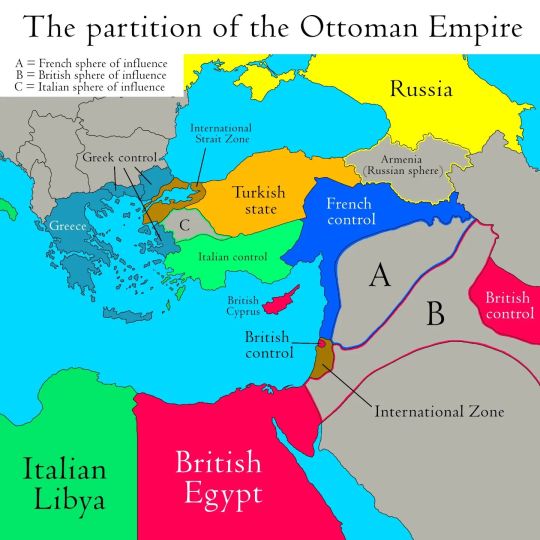
The partition of the Ottoman Empire after World War 1
🇹🇷 After World War I, the Ottoman Empire faced partitioning by the Allied Powers. The Sykes-Picot Agreement (1916) between Britain and France aimed to divide the Ottoman territories into spheres of influence. The agreement proposed British and French control over different regions, including parts of present-day Syria, Iraq, and Lebanon. Additionally, the Treaty of Sèvres (1920) outlined a more detailed plan for the partition of the Ottoman Empire. It proposed the creation of an independent Armenian state and the assignment of various regions to France, Italy, and Greece. However, this treaty was never fully implemented due to the Turkish War of Independence led by Mustafa Kemal Atatürk. The Treaty of Sèvres was replaced by the Treaty of Lausanne in 1923, which recognized the Republic of Turkey and established new borders, marking the end of the Ottoman Empire.
by danmaps_org
116 notes
·
View notes
Text
Analysis, Nov 27th
Last night, the Kurdish People’s Democratic Assembly in Haringey, London, was subject to nothing short of an aggressive invasion by the police. There were no warrants and no legitimate reason for the aggression and violence that they conducted themselves with against a community of civilians celebrating a cultural event. This invasion by the Metropolitan Police comes only two days after UK defence minister Grant Shapps and Turkish counterpart Yaşar Güler held a meeting agreeing to “enhance” defence and security cooperation.
As a result of foreign influence on parliament, we are seeing an increase in the number of people within our communities being arrested through the liberally applied ‘Schedule 7 of the Terrorism Act‘ (2000), including last week when our community was subject to another aggressive display by the police as they swarmed a small protest, outnumbering the protesters themselves and separating parents from the children, then interrogating them in front of their helpless and crying children. There is also the upcoming trial of Mark Campbell and a Kurdish asylum seeker, ‘Berîtan’, on the 17th and 18th of January, who will face trial for holding a Kurdish flag during a protest.
We must also highlight that this year is also 100 years since Kurdistan was divided by the Sykes-Picot agreement. Since that agreement, the Kurdish people have been subject to continuous attempts of ethnic cleansing, genocide, and ecocide by Iran, Iraq, Syria, and Turkey, including the Dersim Massacre, the Anfal Genocide Campaign, the Yazidi Genocide, etc.
As a result, many civilians are forced to seek asylum in the UK and elsewhere. Yet what we are seeing is that, despite Turkey’s support for the ISIS insurgency in North and East Syria, the ethnic cleansing they have committed in Afrîn, and their heinous violations of human rights in Turkish prisons, as members of NATO, Grant Shapps and the UK government would have us believe that they are valuable allies whose “influence cannot be underestimated.”
The Kurdish People’s Democratic Assembly invites all ethnic, religious, and cultural communities and organisations across the UK to unite with us to prevent the criminalisation of communities, mainly through the misuse of the Terrorism Act. The Metropolitan Police should not be a ‘for hire’ mercenary service to do the bidding of foreign dictatorships, and UK politicians must not be able to use the means of the justice system to advance their own political agendas.
Long Live the Democratic Resistance
Biji Berxwedan
~ Kurdish People’s Democratic Assembly Britain
27 notes
·
View notes
Text
#OTD in Irish History | 16 May:
587 – St Brendan the Navigator, early transatlantic voyager, dies. In the Liturgical calendar, today is St Brendan’s Feast Day.
1907 – Birth of Robert Tisdall, gold medalist in the 400 meter hurdles at the 1932 Olympics.
1916 – The United Kingdom of Great Britain and Ireland and the French Third Republic sign the secret wartime Sykes-Picot Agreement partitioning former Ottoman territories such as…
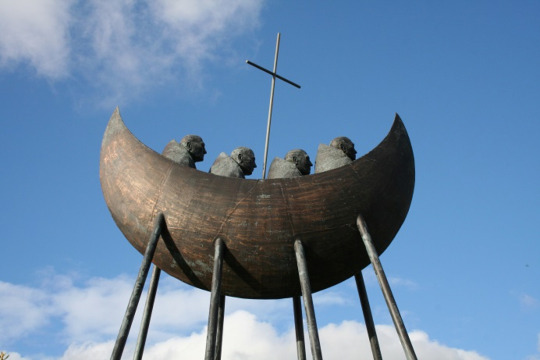
View On WordPress
#irelandinspires#irishhistory#OTD#16 May#An Post#Éamon De Valera#Cahersiveen#Co. Kerry#Feast Day#Fenit#Fianna Fáil#History#History of Ireland#IRA#Ireland#Irish History#Irish War of Independence#Sinn Fein#St. Brendan the Navigator Monument#Today in Irish History#United States#Winston Churchill
7 notes
·
View notes